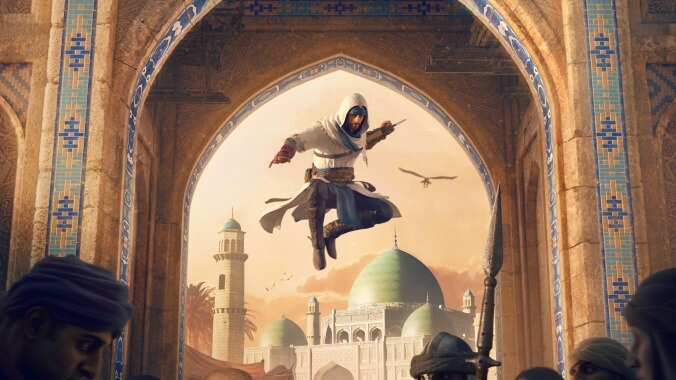Assassin's Creed: Mirage shrinks everything—including its hero's personality
The latest Assassin's Creed is a gorgeous throwback to the series' early days and a welcome return to form, save for one key thing

Every Friday, A.V. Club staffers kick off our weekly open thread for the discussion of gaming plans and recent gaming glories, but of course, the real action is down in the comments, where we invite you to answer our eternal question: What Are You Playing This Weekend?
2020’s Assassin’s Creed: Valhalla was a massive game in basically every respect: Massive map, massive ambitions, massive everything. Its gameplay was expansive, sometimes distractingly so; it wanted to do everything, all the time, and was comfortable pulling the player’s attention in a million different directions while doing it.
By contrast, its brand-new follow-up/prequel, Assassin’s Creed: Mirage, is smaller in almost every respect. More often than not, that decision is to the game’s benefit, as it steps back from the exhilarating, exhausting brink in order to deliver something far more focused, in a down-scaled (and gorgeous!) version of 9th century Baghdad. But there’s one aspect where this decision to embrace restraint has made the game an undeniable disappointment for those of us coming to it after time with Valhalla: Its bland hero. Valhalla’s Eivor Wolf-Kissed can utterly kick Mirage protagonist Basim Ibn Ishaq’s “Hidden One” ass.
At the risk of being very (but fairly) mean to the entire multi-decade Assassin’s Creed franchise (and with some apologies to the genuinely enjoyable Ezio Auditore from the games surrounding II), one of Valhalla’s biggest innovations wasn’t in going colossal, but in crafting an AC hero with some actual charm. An orphan who grows up to be the most badass warrior in all of England, Eivor was a pre-Renaissance Renaissance woman: Drinking, fighting, and philosophizing with the best of them, with Cecilie Stenspil (or Magnus Bruun, if you choose a male Eivor for some inexplicable reason) giving a surprisingly thoughtful performance as the rampaging berserker/professional poet. Much of the pleasure of engaging with Valhalla’s dozens of oddball side missions was in seeing Eivor’s funny “Well, let’s see where this goes” reactions to them; it became easy, after just a few hours with the game, to see why so many historical figures were naturally drawn to her.
Poor Basim simply can’t compare, whether you know where his story is headed (a major part of Valhalla’s ludicrously convoluted plot) or not. As presented in Mirage, he just couldn’t be blander, even by the standards of the series: A street thief with aspirations to do good, he stumbles into the forever-long war between the “Hidden Ones” and the Order Of The Ancients, ultimately meting out justice in the form of series-standard slit throats. Bantering weakly and running through the paces of a basic Assassin’s Creed story (training montage, steady acquisition of skills, weird post-mortem conversations with his targets), he leaves shockingly little impression, and certainly not enough to anchor an entire prequel story. (Without getting into spoilers, even his tale’s biggest twists feel pulled from the Generic Plot Beats bin.)
The odd thing about Mirage is how little of Valhalla (and its predecessors, 2017’s Origins and 2018’s Odyssey, which set the more expansive template the series has followed for the last several games) we find ourselves missing while playing it. It’s nice to have stealth re-emphasized; to navigate a single complicated urban environment; to stalk and sneak and slice with a sense of genuine threat hanging over your head. It’s nice not to need to manage a ginormous skill tree, full of tiny nodes with stat upgrades (to say nothing of not having to worry that this British soldier you’re fighting is inexplicably 20 levels more lethal than the one you were just fighting two minutes ago across the river). And although it can be an adjustment, the ways the game is deliberately out of step with the trends of open-world games are actually kind of refreshing: Navigating Baghdad often feels like a deliberate challenge, as you plot out routes through the city, avoid restricted zones, and keep your notoriety low. The whole game works by going small, except when it comes to its central star.